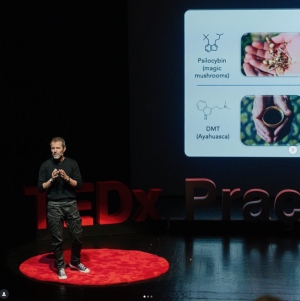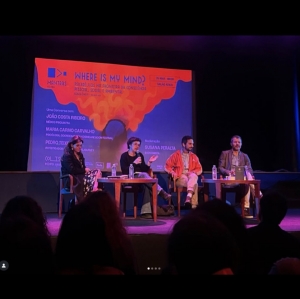Jorge
A Digital Toolkit for Weight Loss Maintenance in European Adults (NoHoW): A 2×2 Factorial Randomized Controlled Trial
Stubbs, R. J., Duarte, C., Dakin, C., Palmeira, A. L., Sniehotta, F. F., Horgan, G. W., Larsen, S., Marques, M. M., Encantado, J., Evans, E. H., Turicchi, J., O'Driscoll, R., Scott, S. E., Pearson, B., Ramsey, L., Mikkelsen, M.-L., Santos, I., Matos, M., Teixeira, P. J., & Heitmann, B. L.. (in press). A Digital Toolkit for Weight Loss Maintenance in European Adults (NoHoW): A 2×2 Factorial Randomized Controlled Trial. JMIR. DOI: 10.2196/69634
Mapping implementation barriers and facilitators of a physical activity consultation in the Portuguese primary healthcare: A qualitative approach combining the Tailored Implementation for Chronic Diseases and Behaviour Change Wheel frameworks
Silva, C. S., Silva, M. N., Encantado, J., Franco, S., Rosa, B. A., Mendes, R., Teixeira, P. J., & Godinho, C. A. (2025). Mapping implementation barriers and facilitators of a physical activity consultation in the Portuguese primary healthcare: A qualitative approach combining the Tailored Implementation for Chronic Diseases and Behaviour Change Wheel frameworks. BMJ Open, 15, Article e091408. https://doi.org/10.1136/bmjopen-2024-091408
On the potential benefits of shared psychedelic experiences: Romantic dyads' co-use and shared understanding are associated with positive long-term changes
Cornelius, T., Moller, A., Encantado, J., Carvalho, L. C. P., Barba, T., & Teixeira, P. (in press). On the potential benefits of shared psychedelic experiences: Romantic dyads' co-use and shared understanding are associated with positive long-term changes. Journal of Humanistic Psychology.
Attitudes and perceptions of portuguese mental health professionals on the therapeutic use of psilocybin and MDMA
Encantado, J., Carvalho, L., Mota, P., Cunha, C., Garcia-Romeu, A., Johnson, M. W., & Teixeira, P. J. (in press). Attitudes and perceptions of portuguese mental health professionals on the therapeutic use of psilocybin and MDMA. Professional Psychology: Research and Practice.
Ayahuasca and public health III: Health status of a sample of ayahuasca ceremony attenders in Portugal
Teixeira, P. J., Encantado, J., Amaro, H. D., Veiga, D., Carvalho, L. C., Alcázar-Córcoles, M. Á., Hallak, J., Guimarães dos Santos, R., Bouso, J. C., & Kohek, M. (in press). Ayahuasca and public health III: Health status of a sample of ayahuasca ceremony attenders in Portugal. Journal of Psychoactive Drugs.
Exploring self-reported health behavior change following naturalistic psychedelic use
Carvalho, L. C., Encantado, J., Moller, A., Cornelius, T., Marrouch, N., Johnson, M., Garcia-Romeu, A., Veiga, D., & Teixeira, P. J. (2025). Exploring self-reported health behavior change following naturalistic psychedelic use. Journal of Health Psychology. 13591053251392867. Advance online publication. https://doi.org/10.1177/13591053251392867
Exploring practitioners’ perceptions of health behavior changes associated with psychedelic experiences
Carvalho, L. C., Encantado, J., van Elk, M., Moller, A. C., Cornelius, T., Veiga, D., & Teixeira, P. J. (2025). Exploring practitioners’ perceptions of health behavior changes associated with psychedelic experiences. Scientific Reports, 15, 44731. https://doi.org/10.1038/s41598-025-33296-w
Translation and Adaptation of the “Self-Regulation of Sport Practice” Questionnaire to Portuguese
Carvalho, A., Encantado, J., Brito, H., Lopes, H. A. S., Vaz de Carvalho, M., Belchior, C. R., & Araújo, D. (2025). Translation and adaptation of the self-regulation of sport practice questionnaire to portuguese. International Journal of Sport and Exercise Psychology. https://doi.org/10.1080/1612197X.2025.2578849
Pedro Teixeira presents talk on psychedelic education at TEDx Lagos
Researcher and professor Pedro Teixeira participated in TEDx Lagos, where he delivered a talk on psychedelic science and its role in contemporary mental health and behavioural studies. In his presentation, Teixeira discussed how substances such as psilocybin and DMT are being investigated for their potential to promote psychological insight and well-being when used in structured, therapeutic contexts.
Drawing on recent scientific findings, he addressed the importance of education, ethical frameworks, and public literacy in shaping future psychedelic-assisted care and research in Portugal and beyond.
“Where Is My Mind?” — Public Discussion Explores Psychedelics and the Frontiers of Consciousness
On March 25, 2025, the Coliseu do Porto Ageas hosted “Where Is My Mind? Psychedelics at the Frontier of Personal, Social, and Environmental Consciousness,” a public conversation examining how psychedelics influence perception, collective well-being, and our relationship with the planet.
The discussion brought together João Costa Ribeiro (psychiatrist), Maria Carmo Carvalho (psychologist and Boom Festival coordinator), and Pedro Teixeira (researcher at the University of Lisbon), under the moderation of Susana Peralta (economist and columnist).
The event formed part of the Mantras 2025 cultural program and aimed to bridge scientific, therapeutic, and ecological perspectives on the expanding field of psychedelic research and practice. Participants reflected on the social and ethical implications of consciousness-expanding experiences, as well as their potential role in promoting individual and collective transformation.


